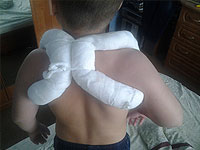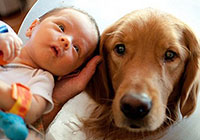Every parent is nice to watch how his child smiles, laughs, murms and reacts to what is happening around him. Children also love it attention constantly surrounding them. And this is not only a manifestation of love, but also a necessary development condition. However, there are children who do not like to pay attention to others and as if they live in their own world...
Content
In 1912, the Swiss Psychiatrist Eygen Blair (Eugean Bleuler) first applied the term «autism» In one of the English medical journals. Then under autism, he meant difficulties arising from schizophrenia patients when communicating with other people. In the form in which we understand it now, autism was defined later, in 1943, Dr. Leo Kanner, who studied the behavior of eleven kids with similar symptoms.
Such children do not seek to know the new, get acquainted, share their emotions. Often they have problems in communicating and social adaptation, nothing interests them. A child who has symptoms similar to those listed above may be painful autism. This problem has several names, including Asperger Syndrome, Rett Syndrome. But each of these disorders is classified as a nervous disorder of the autistic spectrum and differs only by some symptoms.
Autism, developing at the child gradually, begins to appear at the age of one and a half years and is fully formed to three years. Autism has a wide range of symptoms, and in different children, it is manifested in an unequal. This condition affects gestures, movements, speech, reaction. Not all children, patients with autistic, have some physical manifestations of this. Most often, autism is manifested in changes in behavior, such as the following:
Autism can be both soft and in acute form. Many children have similar autism symptoms appear after the start of study at school, but this is normal: the baby gets used to studying, new people, school atmosphere.
Understand the child and work with it is difficult for any parent. Children, patients with autism, require even more attention and care, so, raising a child-out, it is necessary to comply with some recommendations.
-
Cut the child to believe that he is a member of the family, but not the one who pays more attention than the rest. If you get too much attention to such a child, he may not understand you and feel uncomfortable.
-
Allow a little person yourself to make a schedule of walks, feedings, sleep, games. Protected by the parents of the day of the day, correct from the point of view of physiology, may adversely affect the psyche of the baby and strengthen the rejection in behavior.
-
Show your approval every time the child successfully completed the task. Most children-outs do not remember what happened yesterday, and yesterday's praise may seem to them unfortunately.
-
Remember that incorrect behavior quickly goes into habit, so fight it immediately and encourage any adaptation to change, even insignificant. If the child will not feel supported on your part, it will clocked even more and will avoid contact.
-
Give the child a chance to understand a new schedule and take it, otherwise the baby is just lost. Self-esteem increases in children, if every new task will be first completed with them.
-
Give a child to school specializing in learning children with similar problems. The school should provide children with due attention and psychological help.
-
Never show the child of your discontent, because the most important thing in returning such a person to normal life and communication is to make him believe that this world for him, and not against.










